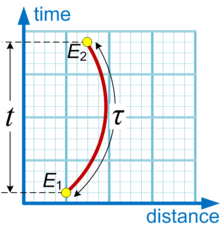
Back زمن حقيقي Arabic প্রকৃত সময় Bengali/Bangla Vlastní čas Czech Хăй вăхăт CV Egentid Danish Zeitdilatation#Eigenzeit German Tiempo propio Spanish زمان ویژه Persian Itseisaika Finnish Temps propre French
In relativity, proper time (from Latin, meaning own time) along a timelike world line is defined as the time as measured by a clock following that line. The proper time interval between two events on a world line is the change in proper time, which is independent of coordinates, and is a Lorentz scalar.[1] The interval is the quantity of interest, since proper time itself is fixed only up to an arbitrary additive constant, namely the setting of the clock at some event along the world line.
The proper time interval between two events depends not only on the events, but also the world line connecting them, and hence on the motion of the clock between the events. It is expressed as an integral over the world line (analogous to arc length in Euclidean space). An accelerated clock will measure a smaller elapsed time between two events than that measured by a non-accelerated (inertial) clock between the same two events. The twin paradox is an example of this effect.[2]

By convention, proper time is usually represented by the Greek letter τ (tau) to distinguish it from coordinate time represented by t. Coordinate time is the time between two events as measured by an observer using that observer's own method of assigning a time to an event. In the special case of an inertial observer in special relativity, the time is measured using the observer's clock and the observer's definition of simultaneity.
The concept of proper time was introduced by Hermann Minkowski in 1908,[3] and is an important feature of Minkowski diagrams.
- ^ Zwiebach 2004, p. 25
- ^ Hawley, John F.; Holcomb, J Katherine A. (2005). Foundations of Modern Cosmology (illustrated ed.). Oxford University Press. p. 204. ISBN 978-0-19-853096-1. Extract of page 204
- ^ Minkowski 1908, pp. 53–111
© MMXXIII Rich X Search. We shall prevail. All rights reserved. Rich X Search